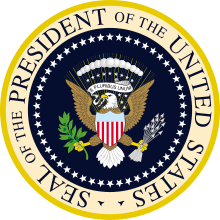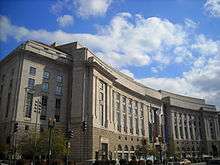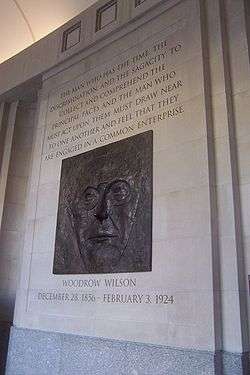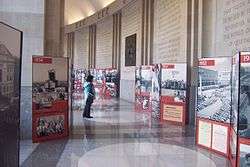Woodrow Wilson International Center for Scholars
 | |
| Motto | Independent Research, Open Dialogue & Actionable Ideas |
|---|---|
| Established | 1968 |
| Type | Government organization Think tank |
| Legal status | United States Presidential Memorial |
| Headquarters | Ronald Reagan Building and International Trade Center |
| Location |
|
Key people |
Jane Harman (Director), Frederic V. Malek (Chairman), Rex Tillerson (Board of Directors) |
| Affiliations | Smithsonian Institution |
| Website | http://www.wilsoncenter.org |
| ||
|---|---|---|
President of the United States
First Term
Second Term
World War I
 |
||
The Woodrow Wilson International Center for Scholars (or Wilson Center), located in Washington, D.C., is a United States Presidential Memorial that was established as part of the Smithsonian Institution by an act of Congress in 1968. It is also a highly-recognized think tank, ranked among the top ten in the world.[1]
Named in honor of President Woodrow Wilson, the only President of the United States to hold a PhD,[2] its mission is "to commemorate the ideals and concerns of Woodrow Wilson by: providing a link between the world of ideas and the world of policy; and fostering research, study, discussion, and collaboration among a full spectrum of individuals concerned with policy and scholarship in national and world affairs."[3]
Organization

The Center was established within the Smithsonian Institution, but it has its own board of trustees, composed both of government officials and of individuals from private life appointed by the President of the United States. The Center's director and staff include scholars, publishers, librarians, administrators, and support staff, responsible to the trustees for carrying out the mission of the Center. The trustees and staff are advised by a group of private citizens called the Wilson Council. Interns, usually undergraduate or graduate students, support the activities of visiting scholars and staff while learning the business of top-level research.
Most of the Center's staff form specialized programs and projects covering broad areas of study. These programs and projects organize and host conferences and seminars, and support many kinds of research, communication, and publication on topics relevant to their areas.
The Center also publishes a digital magazine, the Wilson Quarterly.
In 2013 and again in 2014, the Wilson Center was ranked by the Go To Think Tank Report at the University of Pennsylvania as one of the top ten think tanks in the world. The 2014 rankings named the Wilson Center as 5th best overall in the United States, 4th in the world for international development, 8th in the world for international affairs, and 27th in defense and national security. It was also ranked the "#1 think tank to watch" in the United States and 11th best-managed think tank in the world.[4]
Funding
The Center is a public–private partnership. Approximately one-third of the Center's operating funds come annually from an appropriation from the U.S. government, and the Center itself is housed in a wing of the Ronald Reagan Building, a federal office building where the Center enjoys a 30-year rent-free lease. The remainder of the Center's funding comes from foundations, grants and contracts, corporations, individuals, endowment income, and subscriptions. Because of its historic reliance on congressional appropriations, the Center posts on its website a Plan for Federal Funding Hiatus.[5]
Administration

The Board of Trustees, currently led by Chairman Frederic V. Malek, are appointed to six-year terms by the President of the United States. Trustees serve on various committees including executive, audit and finance, development, investment, fellowship, and investment policy.[6]
- Director, President, and CEO of the Wilson Center: Jane Harman
Board of Directors
- Chairman: Frederic V. Malek, Founder and Chairman, Thayer Lodging Group, a Brookfield Property
- Private citizen members:
- Peter J. Beshar, Executive Vice President & General Counsel, Marsh & McLennan Companies, Inc.
- Thelma Duggin, President, AnBryce Foundation
- Barry S. Jackson, Managing Director, The Lindsey Group and Strategic Advisor, Brownstein Hyatt Farber Schreck
- David Jacobson, Former U.S. Ambassador to Canada and Vice Chair, BMO Financial Group
- Nathalie Rayes, Vice President of Public Affairs, Grupo Salinas
- Earl W. Stafford, Chief Executive Officer, The Wentworth Group, LLC
- Jane Watson Stetson, Philanthropist
- Louis Susman, Former U.S. Ambassador to the United Kingdom
- Public members:
- Alex Azar, Secretary, U.S. Department of Health and Human Services
- Elisabeth DeVos, Secretary, U.S. Department of Education
- David Ferriero, Archivist of the United States
- Carla D. Hayden, Librarian of Congress
- Jon Parrish Peede, Acting Chairman, National Endowment for the Humanities
- Michael Pompeo, Secretary, U.S. Department of State
- David J. Skorton, Secretary, Smithsonian Institution
Woodrow Wilson Awards
Each year, the Woodrow Wilson Center gives out several awards recognizing members of the community who have shown an outstanding commitment to President Woodrow Wilson's dream of integrating politics, scholarship, and policy for the common good. Recipients fall into two award categories, those receiving the award for Public Service, and those receiving the award for Corporate Citizenship. Awardees are selected by the Board, and distributed at dinners benefitting the Center in different locations each year.
Programs
Most of the Center's staff form specialized programs and projects covering broad areas of study.[7] There are approximately 14 programs, some of which are described below.
Africa Program
Established in 1999, the Wilson Center's Africa Program focuses on international affairs issues as affect Africa, conducts programmatic work to train and mentor rising leaders in Burundi and the Democratic Republic of the Congo, and facilitates meetings between the policymaking communities of Washington, D.C., and Africa.[8] Its current director is Monde Muyangawa.[9]
Asia Program
The Wilson Center's Asia Program analyzes the politics, policy, culture, and issues of the broader Asia-Pacific region, encompassing a region stretching from Afghanistan to Japan.[10]
Brazil Institute
Since its founding in 2006, the Brazil Institute has focused on analyzing and convening panels to discuss Brazilian politics, economics, and the country's global profile.[11]
Canada Institute
Founded in 2001, the Canada Institute analyzes Canada-U.S. relations, trade, and Canada's international role as polar ice melts.[12]
Cold War International History Project
The Cold War International History Project (CWIHP) supports the full and prompt release of historical materials by governments on all sides of the Cold War, seeking to integrate new sources, materials and perspectives from the former Eastern Bloc with the historiography of the Cold War. In particular, it disseminates new information and perspectives from previously inaccessible sources from the former Communist world on the history of the Cold War.
In 2011, the Woodrow Wilson International Center for Scholars partnered with East China Normal University (ECNU), Shanghai, to launch the ECNU-Wilson Center Cold War Studies Initiative, it is supported by the Wilson Center's flagship Cold War International History Project (CWIHP) and ECNU's Cold War International Studies Center, the first Cold War Studies center in China.
Environmental Change and Security Program
The Environmental Change and Security Program (ECSP) was founded in 1994 to explore the connections among environmental, health, and population dynamics and their links to conflict, human insecurity, and foreign policy.
History and Public Policy Program
The History and Public Policy Program (HAPP) at the Woodrow Wilson Center focuses on the relationship between history and policy-making and seeks to foster open, informed and non-partisan dialogue on historically relevant issues.
Kennan Institute
The Kennan Institute (KI), founded in 1974 as a division of the Woodrow Wilson International Center for Scholars, is committed to improving American understanding of Russia and the successor states to the Soviet Union.
Kissinger Institute on China and the United States
The Kissinger Institute analyzes the political, economic, historical, and cultural relationships between the United States and China. Named after Henry A. Kissinger, who as secretary of state was instrumental in opening diplomatic relations between the U.S. and China.[13] Its current director is Robert Daly.[14]
Mexico Institute
The Wilson Center's Mexico Institute conducts original research and analysis on Mexico's economy, convenes meetings, and proposes public policies.[15] The institute focuses on five key areas: Mexico's security and rule of law, economic competitiveness (both of Mexico and the transnational economies along the border), migration, the U.S.-Mexico border, and energy issues.
Middle East Program
The Middle East Program, launched in 1998, analyzes geopolitical, cultural, and social trends in the Middle East and North Africa region.[16] From May 8 until August 21, 2007, Dr. Haleh Esfandiari, then-director of the Middle East Program, was imprisoned in Tehran, Iran, in the Evin Prison.[17] She was released on bail and had her passport returned to her on September 2, 2007. Esfandiari was then permitted to leave Iran.[18] The former director of the Middle East Program is Dr. Henri Barkey.[19]

North Korea International Documentation Project
The North Korea International Documentation Project translates and disseminates newly declassified documents about North Korea, largely drawing from its former communist allies.[21] The documents are then distributed on the Wilson Center's Digital Archive site and curated in the project's dossier series.[22]
Science and Technology Innovation Program (STIP)
STIP focuses on understanding bottom-up, public innovation; top-down, policy innovation; and, on supporting responsible and equitable practices at the point where new technology and existing political, social, and cultural processes converge.
See also
- The Wilson Quarterly, the center's journal
- Murray Feshbach
- A National Strategic Narrative
References
- ↑ "Archived copy" (PDF). Archived from the original (PDF) on 2014-03-07. Retrieved 2014-02-25.
- ↑ "Wilson, Woodrow".
- ↑ "About Woodrow Wilson International Center for Scholars". Wilsoncenter.org. Retrieved 2014-02-01.
- ↑ http://repository.upenn.edu/cgi/viewcontent.cgi?article=1008&context=think_tanks
- ↑ https://www.wilsoncenter.org/sites/default/files/wilson_center_plan_for_possible_lapse_in_federal_appropriation_revised_august_2015.pdf
- ↑ "Leadership". 7 June 2011.
- ↑ "Programs @ The Woodrow Wilson Center". Wilsoncenter.org. Archived from the original on 2011-06-29. Retrieved 2014-02-01.
- ↑ "The Burundi Leadership Training Program". Wilson Center. 2008-01-25. Retrieved 2017-11-12.
- ↑ "Monde Muyangwa". Wilson Center. Retrieved 2017-11-12.
- ↑ "About". Wilson Center. Retrieved 2017-11-12.
- ↑ "About". Wilson Center. Retrieved 2017-11-12.
- ↑ "About". Wilson Center. Retrieved 2017-11-12.
- ↑ "About". Wilson Center. Retrieved 2017-11-12.
- ↑ "Robert Daly". 22 July 2011.
- ↑ "About". 11 July 2011.
- ↑ "About". 11 July 2011.
- ↑ Wright, Robin (May 8, 2007). "Tehran Jails Iranian American Scholar After Long House Arrest". The Washington Post.
- ↑ "Freed Scholar Leaves Iran to Meet Family". The New York Times. Associated Press. September 3, 2007.
- ↑ "Bio: Henri J. Barkey". Wilsoncenter.org. 2014-01-28. Retrieved 2018-10-10.
- ↑ "Photo Exhibition: Polish People's Republic—So Far Away and So Close By". Wilsoncenter.org. 2014-01-28. Archived from the original on 2011-06-05. Retrieved 2014-02-01.
- ↑ "About". Wilson Center. Retrieved 2017-11-12.
- ↑ "NKIDP e-Dossier Series". 7 July 2011.
External links
- Woodrow Wilson International Center for Scholars
- The Wilson Center Digital Archive of once-secret documents from governments all across the globe
- The Wilson Quarterly, a digital magazine published by the Wilson Center

